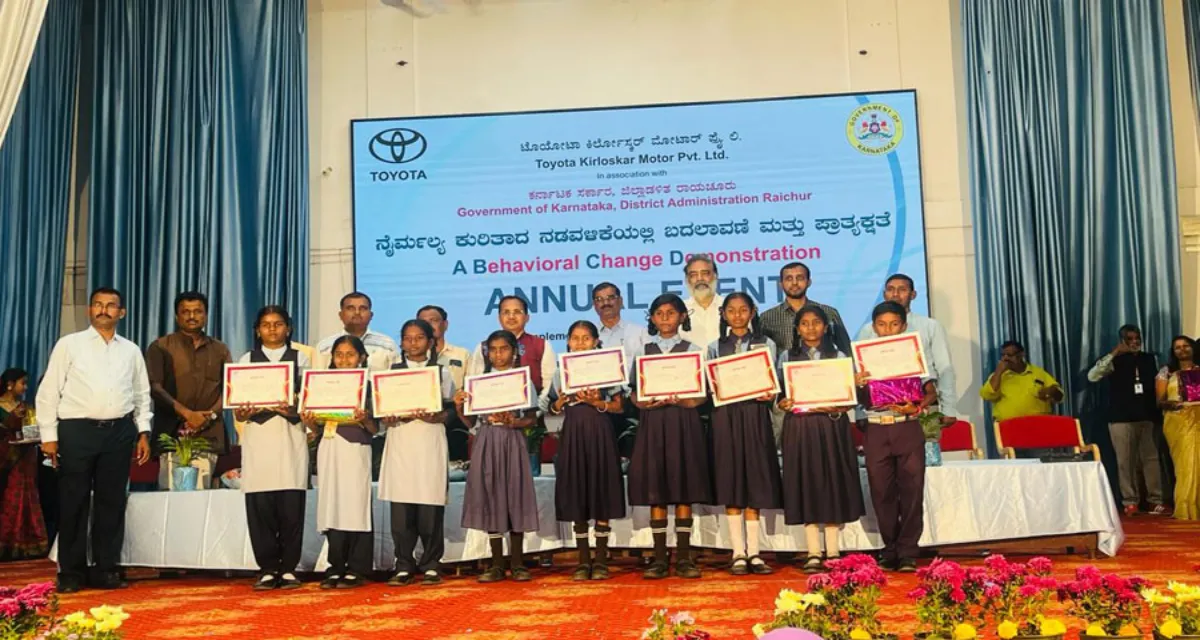
Toyota Expands ABCD Program in Ramanagara Schools to Promote Better Sanitation

Toyota Expands ABCD Program in Ramanagara Schools to Promote Better Sanitation
Toyota Kirloskar Motor (TKM) is stepping up its commitment to promoting better sanitation and hygiene practices in schools across India. In a recent announcement, the company revealed plans to expand its flagship ABCD (A Behavioural Change Demonstration) program in Ramanagara district, Karnataka. This move is part of a broader effort to enhance hygiene education and ensure that students in government schools have access to essential sanitation facilities and knowledge.
The ABCD program was initially launched in 2015, and since then, it has grown significantly, impacting over 58,000 students and 400,000 community members by 2019. However, like many initiatives, it faced setbacks during the COVID-19 pandemic. Recognizing the need to continue fostering good hygiene practices, Toyota revamped the program in 2023, aiming to reach more students and improve sanitation in schools.
India, being the world's most populous country, faces significant challenges when it comes to public sanitation and hygiene. National programs like "Swachh Bharat Abhiyan" have played a crucial role in addressing these issues, but corporations like Toyota are also stepping in to support the cause. The ABCD program has proven to be a strong ally in this mission, specifically targeting government schools in rural areas like Ramanagara district.
In the 2023-24 fiscal year, Toyota reintroduced the ABCD program in 250 government schools, reaching 12,000 students. The results have been impressive. Students' understanding of sanitation practices jumped from 26.8% to a staggering 96.5%. This dramatic improvement is a testament to the program's effectiveness in making hygiene education accessible and engaging for young minds.
But Toyota's efforts don't stop at education. The company has also taken steps to improve the physical sanitation facilities in these schools. Washrooms have been repaired, taps replaced, and deep cleaning conducted to ensure the hygiene standards are not just taught but also practiced in daily life.
The success of the ABCD program has inspired Toyota to push even further. In the fiscal year 2024-25, the company plans to expand the program to 550 more schools in the Ramanagara district. This expansion aims to benefit an additional 28,000 students, providing them with the tools and knowledge to maintain proper sanitation practices.
One of the key strategies of the program is empowering students themselves to become champions of hygiene. Toyota has introduced the concept of "classroom champions," where students are selected to lead by example and help train their peers. This peer-driven approach ensures that the lessons learned through the ABCD program are passed on to future generations of students.
Moreover, the program doesn't just focus on students. School leaders, including headmasters and headmistresses, are also brought on board through specialized orientation programs. These programs emphasize the importance of maintaining a culture of cleanliness and hygiene within schools, making sure that leadership is aligned with the program’s goals.
The ABCD program has not only transformed hygiene practices in schools but also made waves on a global scale. It has been recognized in the prestigious Harvard Business Review and included in a collection of case studies at Harvard Business School. This recognition highlights the program's broader social impact and its role in fostering behavioral change within communities.
By empowering students to become hygiene ambassadors, the program is extending its reach beyond school walls. These young champions carry the lessons they learn into their homes and neighborhoods, spreading awareness and promoting better sanitation practices within their communities. The ripple effect of this education is profound, creating a lasting cultural shift toward better hygiene.
Another innovative aspect of the ABCD program is its focus on school cabinets and local committees. Toyota has involved School Development and Monitoring Committees (SDMCs) to ensure that hygiene practices are sustained long after the initial program activities. These committees play a critical role in monitoring and maintaining sanitation standards, keeping schools accountable for their cleanliness.
Toyota is also providing essential consumables, such as cleaning supplies, to the participating schools. Regular assessments are conducted to measure the effectiveness of the program and track improvements in students' knowledge and behaviors related to sanitation. This data-driven approach ensures that the program remains dynamic and responsive to the needs of the schools.
Speaking about the program’s impact, Vikram Gulati, Country Head and Executive Vice President of Corporate Affairs & Governance at Toyota Kirloskar Motor, expressed his pride in the program's achievements. "The ABCD Sanitation Program has had a transformative effect on the community. It’s inspiring to see how it empowers students and fosters a mindset change toward better hygiene and sanitation," Gulati stated.
Toyota’s expansion of the ABCD program in the Ramanagara district reflects the company’s dedication to nurturing young minds and equipping them with life skills that extend far beyond the classroom. By working closely with the Education Department and local authorities, Toyota aims to create a sustainable impact that resonates throughout the district.
In the final statement, With the expansion of the ABCD program, Toyota Kirloskar Motor is not just addressing immediate sanitation needs but is also laying the groundwork for long-term behavioral change. By empowering students, school leaders, and communities, the program is building a brighter, cleaner future for everyone involved. As the program continues to grow, its impact will be felt not only in Ramanagara but across India, as more students learn the value of good hygiene and become champions of sanitation in their own right.
Also Read: